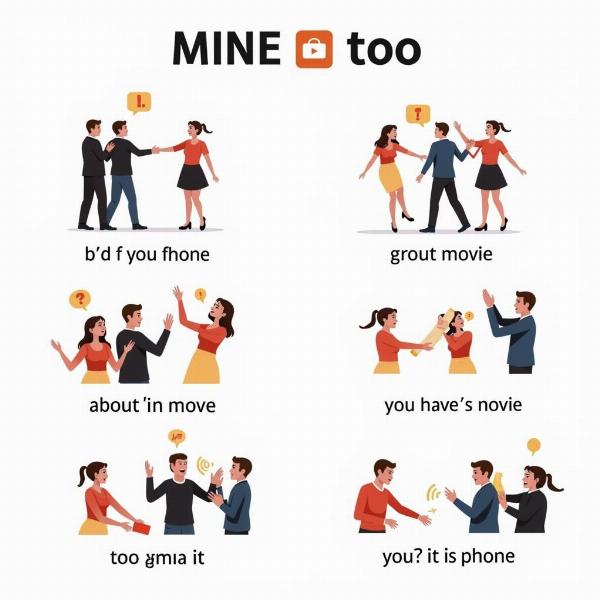Understanding the nuances of conversational phrases like “me too” or “mine too” when translating to Hindi can be tricky. While a direct word-for-word translation might not always convey the intended meaning, capturing the essence of agreement and shared experience is key. This article explores various ways to express “mine too” in Hindi, considering different contexts and cultural nuances to ensure accurate and natural-sounding communication. We’ll examine common scenarios, provide examples, and discuss the importance of understanding implied meanings for effective cross-cultural dialogue.
Understanding the Nuances of “Mine Too”
“Mine too” implies agreement and shared possession or experience. It’s a concise way of expressing that you also have or feel something similar to what someone else has mentioned. In Hindi, conveying this sentiment requires considering the specific context. Are you referring to a physical object, a feeling, an experience, or something else? This understanding is crucial for choosing the appropriate translation.
Common Hindi Equivalents of “Mine Too”
There isn’t one single perfect translation for “mine too” in Hindi. The best option depends on the context. Here are some common equivalents:
- मेरा भी (Merā bhī): This is the most common and versatile translation, meaning “mine also” or “of me also”. It works well in most situations. For example, if someone says “मुझे यह किताब पसंद है (Mujhe yeh kitaab pasand hai) – I like this book”, you can respond “मेरा भी (Merā bhī) – Mine too”.
- मुझे भी (Mujhe bhī): This translates to “me too” and is suitable when referring to experiences or feelings. If someone says “मुझे नींद आ रही है (Mujhe neend aa rahi hai) – I’m feeling sleepy”, you can reply “मुझे भी (Mujhe bhī) – Me too”.
- मेरे पास भी (Mere paas bhī): This means “I have it too” and is used when referring to possessions. If someone says “मेरे पास एक नई कार है (Mere paas ek nayi car hai) – I have a new car”, you could respond “मेरे पास भी (Mere paas bhī) – I have one too”.
Contextual Examples of “Mine Too” in Hindi
Let’s explore some practical examples to understand how these translations work in different situations:
- Scenario 1: Sharing a Preference: “I love Indian food.” – “मुझे भी! (Mujhe bhī!)”
- Scenario 2: Expressing a Similar Feeling: “I’m so tired.” – “मुझे भी बहुत थकान हो रही है (Mujhe bhī bahut thakaan ho rahi hai) – I’m also feeling very tired.”
- Scenario 3: Indicating Shared Possession: “I have a blue pen.” – “मेरे पास भी एक नीली पेन है (Mere paas bhī ek neeli pen hai) – I also have a blue pen.”
 Hindi Translation of Mine Too
Hindi Translation of Mine Too
Beyond the Literal Translation: Cultural Sensitivity
While knowing the direct translations is essential, understanding the cultural context is equally important. In some situations, a more elaborate response might be appreciated, showing genuine engagement and empathy. For instance, instead of just saying “Merā bhī,” you could add a phrase like “बिल्कुल सही (Bilkul sahi) – Absolutely right” or “मैं भी ऐसा ही सोचता/सोचती हूँ (Main bhī aisa hi sochta/sochti hun) – I think so too” to express stronger agreement.
Choosing the Right Phrase: Key Considerations
- The nature of the shared element: Is it a physical object, an emotion, an opinion, or an experience?
- The level of formality: Are you speaking to a friend, a family member, or a stranger?
- The desired emphasis: Do you want to simply agree or express a stronger sentiment?
Conclusion
Successfully translating “mine too” into Hindi involves more than just memorizing a few phrases. It requires understanding the subtle nuances of the context and choosing the most appropriate expression to convey your intended meaning accurately and naturally. By considering the examples and guidelines presented here, you can navigate these linguistic intricacies with confidence and enhance your cross-cultural communication skills. Remember, effective communication goes beyond words; it’s about conveying meaning and building connections.
FAQs
-
What is the most common way to say “mine too” in Hindi? The most common and versatile translation is “मेरा भी (Merā bhī)”.
-
Is there a difference between “मेरा भी” and “मुझे भी”? Yes, “मेरा भी” refers to possessions or qualities, while “मुझे भी” refers to experiences or feelings.
-
When should I use “मेरे पास भी”? Use “मेरे पास भी” when you want to say “I have it too” in the context of possessions.
-
How can I make my response sound more natural? Consider adding phrases like “बिल्कुल सही” or “मैं भी ऐसा ही सोचता/सोचती हूँ” to express stronger agreement.
-
Why is understanding context important when translating “mine too”? Context helps you choose the most accurate and natural-sounding translation, ensuring effective communication.
Meaning-Hindi.in is your one-stop solution for all your Hindi translation needs. We offer a wide range of professional translation services, including business and commercial document translation, certified and legal document translation, technical and user manual translation, website and localization services, educational and academic document translation, express translation, and specialized translation services. Contact us today for a free quote! Email: [email protected], Phone: +91 11-4502-7584. Meaning-Hindi.in offers accurate and culturally sensitive translations to bridge the communication gap.